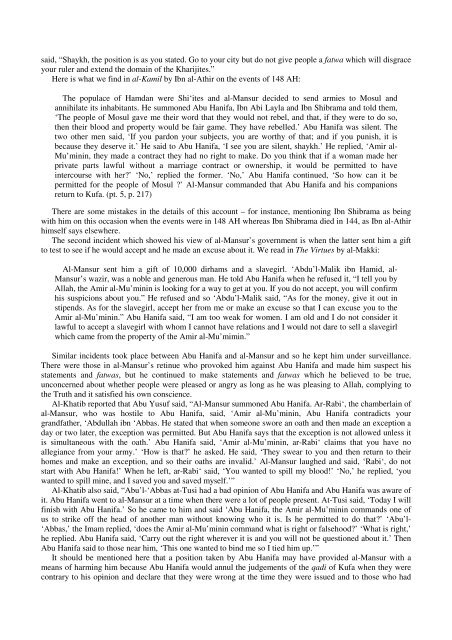Create successful ePaper yourself
Turn your PDF publications into a flip-book with our unique Google optimized e-Paper software.
said, “Shaykh, the position is as you stated. Go to your city but do not give people a fatwa which will disgrace<br />
your ruler <strong>and</strong> extend the domain of the Kharijites.”<br />
Here is what we find in al-Kamil by Ibn al-Athir on the events of 148 AH:<br />
The populace of Hamdan were Shi‘ites <strong>and</strong> al-Mansur decided to send armies to Mosul <strong>and</strong><br />
annihilate its inhabitants. He summoned <strong>Abu</strong> <strong>Hanifa</strong>, Ibn Abi Layla <strong>and</strong> Ibn Shibrama <strong>and</strong> told them,<br />
‘The people of Mosul gave me their word that they would not rebel, <strong>and</strong> that, if they were to do so,<br />
then their blood <strong>and</strong> property would be fair game. They have rebelled.’ <strong>Abu</strong> <strong>Hanifa</strong> was silent. The<br />
two other men said, ‘If you pardon your subjects, you are worthy of that; <strong>and</strong> if you punish, it is<br />
because they deserve it.’ He said to <strong>Abu</strong> <strong>Hanifa</strong>, ‘I see you are silent, shaykh.’ He replied, ‘Amir al-<br />
Mu’minin, they made a contract they had no right to make. Do you think that if a woman made her<br />
private parts lawful without a marriage contract or ownership, it would be permitted to have<br />
intercourse with her?’ ‘No,’ replied the former. ‘No,’ <strong>Abu</strong> <strong>Hanifa</strong> continued, ‘So how can it be<br />
permitted for the people of Mosul ?’ Al-Mansur comm<strong>and</strong>ed that <strong>Abu</strong> <strong>Hanifa</strong> <strong>and</strong> his companions<br />
return to Kufa. (pt. 5, p. 217)<br />
There are some mistakes in the details of this account – for instance, mentioning Ibn Shibrama as being<br />
with him on this occasion when the events were in 148 AH whereas Ibn Shibrama died in 144, as Ibn al-Athir<br />
himself says elsewhere.<br />
The second incident which showed his view of al-Mansur’s government is when the latter sent him a gift<br />
to test to see if he would accept <strong>and</strong> he made an excuse about it. We read in The Virtues by al-Makki:<br />
Al-Mansur sent him a gift of 10,000 dirhams <strong>and</strong> a slavegirl. ‘Abdu’l-Malik ibn Hamid, al-<br />
Mansur’s wazir, was a noble <strong>and</strong> generous man. He told <strong>Abu</strong> <strong>Hanifa</strong> when he refused it, “I tell you by<br />
Allah, the Amir al-Mu’minin is looking for a way to get at you. If you do not accept, you will confirm<br />
his suspicions about you.” He refused <strong>and</strong> so ‘Abdu’l-Malik said, “As for the money, give it out in<br />
stipends. As for the slavegirl, accept her from me or make an excuse so that I can excuse you to the<br />
Amir al-Mu’minin.” <strong>Abu</strong> <strong>Hanifa</strong> said, “I am too weak for women. I am old <strong>and</strong> I do not consider it<br />
lawful to accept a slavegirl with whom I cannot have relations <strong>and</strong> I would not dare to sell a slavegirl<br />
which came from the property of the Amir al-Mu’mimin.”<br />
Similar incidents took place between <strong>Abu</strong> <strong>Hanifa</strong> <strong>and</strong> al-Mansur <strong>and</strong> so he kept him under surveillance.<br />
There were those in al-Mansur’s retinue who provoked him against <strong>Abu</strong> <strong>Hanifa</strong> <strong>and</strong> made him suspect his<br />
statements <strong>and</strong> fatwas, but he continued to make statements <strong>and</strong> fatwas which he believed to be true,<br />
unconcerned about whether people were pleased or angry as long as he was pleasing to Allah, complying to<br />
the Truth <strong>and</strong> it satisfied his own conscience.<br />
Al-Khatib reported that <strong>Abu</strong> Yusuf said, “Al-Mansur summoned <strong>Abu</strong> <strong>Hanifa</strong>. Ar-Rabi‘, the chamberlain of<br />
al-Mansur, who was hostile to <strong>Abu</strong> <strong>Hanifa</strong>, said, ‘Amir al-Mu’minin, <strong>Abu</strong> <strong>Hanifa</strong> contradicts your<br />
gr<strong>and</strong>father, ‘Abdullah ibn ‘Abbas. He stated that when someone swore an oath <strong>and</strong> then made an exception a<br />
day or two later, the exception was permitted. But <strong>Abu</strong> <strong>Hanifa</strong> says that the exception is not allowed unless it<br />
is simultaneous with the oath.’ <strong>Abu</strong> <strong>Hanifa</strong> said, ‘Amir al-Mu’minin, ar-Rabi‘ claims that you have no<br />
allegiance from your army.’ ‘How is that?’ he asked. He said, ‘They swear to you <strong>and</strong> then return to their<br />
homes <strong>and</strong> make an exception, <strong>and</strong> so their oaths are invalid.’ Al-Mansur laughed <strong>and</strong> said, ‘Rabi‘, do not<br />
start with <strong>Abu</strong> <strong>Hanifa</strong>!’ When he left, ar-Rabi‘ said, ‘You wanted to spill my blood!’ ‘No,’ he replied, ‘you<br />
wanted to spill mine, <strong>and</strong> I saved you <strong>and</strong> saved myself.’”<br />
Al-Khatib also said, “<strong>Abu</strong>’l-‘Abbas at-Tusi had a bad opinion of <strong>Abu</strong> <strong>Hanifa</strong> <strong>and</strong> <strong>Abu</strong> <strong>Hanifa</strong> was aware of<br />
it. <strong>Abu</strong> <strong>Hanifa</strong> went to al-Mansur at a time when there were a lot of people present. At-Tusi said, ‘Today I will<br />
finish with <strong>Abu</strong> <strong>Hanifa</strong>.’ So he came to him <strong>and</strong> said ‘<strong>Abu</strong> <strong>Hanifa</strong>, the Amir al-Mu’minin comm<strong>and</strong>s one of<br />
us to strike off the head of another man without knowing who it is. Is he permitted to do that?’ ‘<strong>Abu</strong>’l-<br />
‘Abbas,’ the <strong>Imam</strong> replied, ‘does the Amir al-Mu’minin comm<strong>and</strong> what is right or falsehood?’ ‘What is right,’<br />
he replied. <strong>Abu</strong> <strong>Hanifa</strong> said, ‘Carry out the right wherever it is <strong>and</strong> you will not be questioned about it.’ Then<br />
<strong>Abu</strong> <strong>Hanifa</strong> said to those near him, ‘This one wanted to bind me so I tied him up.’”<br />
It should be mentioned here that a position taken by <strong>Abu</strong> <strong>Hanifa</strong> may have provided al-Mansur with a<br />
means of harming him because <strong>Abu</strong> <strong>Hanifa</strong> would annul the judgements of the qadi of Kufa when they were<br />
contrary to his opinion <strong>and</strong> declare that they were wrong at the time they were issued <strong>and</strong> to those who had














